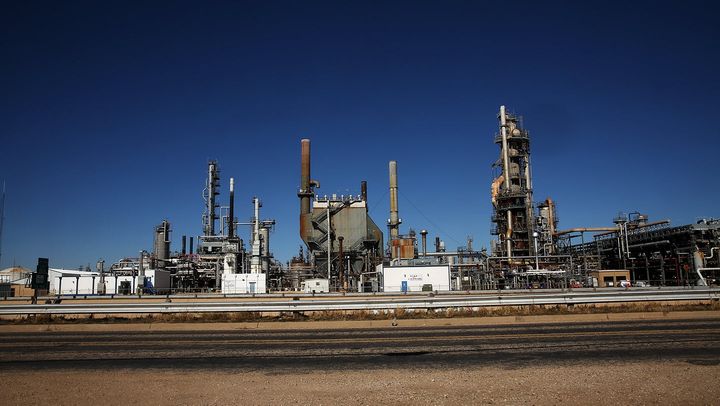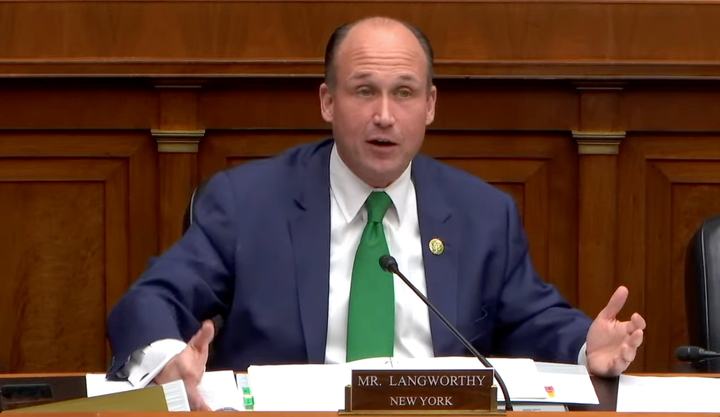This post was authored by researcher and writer Asher Stockler.
At first glance, the website Energy In Depth appears to be a repository for pro-oil industry articles and energy business news. The site is “a project of the Independent Petroleum Association of America” (IPAA), a business league representing thousands of small oil and gas producers, that bills itself as an effort to dispense “research, education and public outreach” about responsible energy development. What you’ll find no mention of, however, are the project’s origins as a massive PR campaign—the brainchild of a multinational consulting firm—with numerous ties to the petroleum industry’s biggest players.
Environmental news website DeSmogBlog obtained an internal memo written by IPAA President Barry Russell in 2009, at Energy In Depth’s inception, noting that the project “would not be possible without the early financial commitments” of, among others, BP, Chevron, Shell, Halliburton, and XTO Energy, which would be acquired by ExxonMobil the following year. While these oil industry giants may have funded the website’s launch, Energy In Depth’s ties to Big Oil extend deeper than has been previously reported.
Across Energy In Depth’s homepage, a smattering of headlines promote natural gas development and rebuke attempts to regulate the industry. In a piece drawing on Secretary of State Mike Pompeo’s comments to an energy consulting firm, Lindsay Mackinson celebrates the “shale revolution” as a boon to the “U.S. economy and energy security.” Another piece from Dan Alfaro lauds the potential of natural gas to “reshape the domestic energy landscape.” Energy In Depth posts a range of these pieces every day, documenting pro-natural gas minutiae and resisting oil and gas industry criticisms at every level.
The articles on Energy In Depth are not written by oil and gas industry experts, but by employees of the global consulting firm, FTI Consulting, something that is not disclosed in the article bylines or anywhere else on the site. FTI Consulting provides consulting and PR services to companies in numerous industries and counts among its clients oil and gas giants including ExxonMobil, Chevron, Shell, and Halliburton.
A 2014 white paper authored by FTI consultants reveals the PR firm’s centrality to the Energy In Depth project, explaining that FTI “teamed up” with IPAA to launch the website. In fact, FTI consultants create much, if not all, of the content available on Energy In Depth. (Nowhere on the Energy In Depth website is this relationship disclaimed.) The site is not simply a valuable oil-propaganda tool for IPAA, but it serves as a scalable business model for FTI, supporting the firm’s various rapid-response information campaigns “that can be easily translated to any issue and anywhere in the world.” The aggressiveness with which FTI consultants resist any criticism of the oil and gas sector on Energy In Depth is rooted in FTI’s approach to public relations: “Each day, what appears in the media must be compiled and responded to,” often, through the establishment of a public relations “war room.”
“The way to accomplish [media relations],” the white paper argues, “is to have a team in place that is knowledgeable, responsive and absolutely relentless in ensuring the proper facts are brought to light—and provide that team the ability to say, do and write things that individual company employees cannot and should not.”
Financed by Big Oil
Since October, Energy In Depth has spent $36,000 on an ad campaign, implemented by FTI Consulting, to defend ExxonMobil on Twitter against a New York State lawsuit alleging the oil giant misled investors about the risks of climate change. Energy In Depth has been running an additional pro-Exxon ad campaign on Facebook worth between $35,000 and $140,000 since August. Though Energy In Depth is a project of an independent oil and gas producers coalition, it continues to offer a zealous defense of Exxon’s interests in the public domain. The group claims that the so-called #ExxonKnew lawsuit isn’t about “any one particular energy company” but is part of a “much broader anti-fossil fuel campaign,” so their work defending Exxon on social media would serve a greater interest. But the devotion of significant resources to a robust, public campaign on Exxon’s behalf raises questions about the sincerity of this explanation and about IPAA’s ties to top oil groups, often through FTI Consulting.
From 2015 to 2017, ExxonMobil’s subsidiary XTO Energy donated nearly $20,000 to IPAA’s affiliated educational initiative, according to ExxonMobil’s annual charitable giving reports. The IPAA Educational Foundation subsidizes several “petroleum academies,” providing curricula and other material support to high school programs that prepare students for careers in the oil and gas sector.
IPAA’s educational initiatives also receive support from other oil giants, such as Chevron and Shell, though Halliburton’s contributions in particular stand out. The co-chair of IPAA’s educational program is Galen Cobb, vice president of industry relations for Halliburton. (The initiative’s advisory board also includes executives from Shell, Gulf, and BP.) Halliburton donated over $50,000 to IPAA’s educational arm from 2014 to 2016 and provides direct financial support to IPAA by regularly sponsoring the association’s midyear meetings, a contribution worth at least $10,000 annually.
IPAA describes its role as educating “the congress, public, and national news media concerning the role of independent producers.” In service of this mission, IPAA has “joined forces with the Business Industry Political Action Committee,” or BIPAC, to help its member corporations “achieve their election and public policy goals,” according to the organization’s annual tax return. BIPAC is a political action committee representing a cross-section of the American business community. It bundles contributions for political donations and provides corporations with voter outreach and education services. According to Slate, “[BIPAC’s] primary aim isn’t to help individual candidates win office; rather BIPAC’s goal is to turn as many private employers as possible into “employee political education” machines for business interests. BIPAC urges major companies to transform their workforces into a voting bloc and provides sophisticated tools that show employers how to do it.”
In the most recent election cycle, BIPAC received $50,000 from Koch Industries. Barry Russell, IPAA’s president and CEO, serves on BIPAC’s board. The group receives small, yearly contributions from Halliburton, and a Halliburton executive sits on its board of directors.
Academic and Think Tanks Ties
Beyond political intermingling, academia serves as another realm where IPAA’s business intersects with that of top oil companies. Rice University houses a public policy department called the Baker Institute. ExxonMobil is a member of the Energy Forum within the Baker Institute’s Center for Energy Studies. The Center for Energy Studies is a public policy and research program focused on energy production that also functions as a matchmaker between corporate money and energy scholarship.
Membership at Exxon’s level requires an endowment to Rice University of $50,000 and entitles the company to a “private briefing on energy matters” and influence over the center’s research priorities. Shell, BP, and Chevron are all members of the Energy Forum. Two independent oil producers, ConocoPhillips and Marathon Oil, also have seats on the Energy Forum and pay the same endowments. Executives at both companies are on IPAA’s board of directors.
One organization that often finds itself at the juncture of oil money and influence sits on the Energy Forum’s more exclusive Director’s Circle: FTI Consulting. (Another member of the Director’s Circle is Saudi Aramco, Saudi Arabia’s state-owned oil behemoth and the most profitable company in the world.)
FTI Consulting has a practice devoted to energy and natural resources within its PR department that was founded in 2009 by Brian Kennedy, then a new consultant at the firm. Around the time Kennedy was building out the energy practice and acquiring new clients, such as IPAA, he was also representing the Institute for Energy Research as their senior vice president for communications.
A think tank founded by Charles Koch, the Institute for Energy Research promotes pro-oil policies and has received hundreds of thousands of dollars from ExxonMobil. The institute paid FTI over $100,000 for consulting services in 2009, according to its annual tax filing. Another FTI staffer and “team lead” for Energy In Depth, Chris Tucker, was consulting on the firm’s Institute for Energy Research account at the same time he was representing Energy In Depth.
“Think tanks lack the protections that academic institutions have. That’s why I wouldn’t call what think tanks do an ‘academic process…’ nor would I say they have ‘academic integrity,’” Tom Medvetz, professor of sociology at U.C. San Diego, told Sludge in a written statement. “[Think tanks] send out signals to prospective funders about the kinds of positions they’re willing to take, the kinds of publicity they can get, and the connections they have to people in positions of political power.”
Other Energy In Depth consultants come from think tank backgrounds too. Steve Everley, who claims to be recognized as “one of the top ten oil and gas experts on Twitter,” is a consultant in FTI’s energy and PR practice. Prior to his employment with FTI, Everley worked for the American Enterprise Institute, a Koch-backed anti-regulation think tank that has received nearly $1 million from Exxon. Everley has also written pieces for Energy In Depth and is referred to multiple times on the site as “EID’s Steve Everley,” even though his status as a PR consultant is not disclosed.
FTI muddies the distinction between its representation of Big Oil and small oil clients in more direct ways. Earlier this year, environmental nonprofit EarthRights revealed an incident where FTI employees, identifying themselves as reporters for the energy website Western Wire, attempted to question the organization about its lawsuit against ExxonMobil. As EarthRights indicated in a press release, Western Wire is a project of the Western Energy Alliance, which counts as a board member Exxon executive Greg Pulliam. Noteworthy, however, is the affiliation of Western Wire’s opinion editor, FTI consultant Matt Dempsey. Dempsey is not just one of the two “reporters” who approached EarthRights regarding its Exxon suit (on behalf of a website overseen, in part, by an Exxon executive), but he is also a consultant for Energy In Depth.
While FTI serves as a nexus for large oil interests and think tank pablum, the consulting firm is not IPAA’s sole legal connection to the broader world of Big Oil. Since 2015, IPAA has paid BakerHostetler over $1 million for legal services, according to the organization’s tax filings. BakerHostetler is one of the largest law firms in the U.S. and has represented both Exxon and Chevron. This nexus offers yet another example of the revolving door between academia and advocacy—former BakerHostetler attorney Gabriel Collins, whose firm represented oil and gas interests, left the practice in 2016 to become a fellow at the Center for Energy Studies.
It is unclear exactly how much money IPAA spends on PR services from FTI Consulting. The firm isn’t specifically listed as an independent contractor on IPAA’s annual tax returns, which require disclosure of companies providing services worth in excess of $100,000. This appears to indicate that IPAA is paying FTI less than the reporting threshold every year, though the money for FTI’s services likely comes from IPAA’s nearly $3 million yearly budget for consulting.
No transparency
Last month, Energy In Depth took note of an amicus brief Senator Sheldon Whitehouse (D-R.I.) filed in support of a case that was being represented by lawyers who had donated to the senator. The website recalled that “Senator Whitehouse has said that entities filing amicus briefs on climate litigation should disclose their donors,” and criticized him for “[failing] to note his own financial ties to the lawyers who stand to make hundreds of millions of dollars should they win their cases.” But Energy In Depth, to the detriment of the public, does not meet these same standards for transparency.
In 2014, IPAA filed an amicus brief on behalf of the coal mining company Murray Energy. Murray Energy had sued the EPA in opposition to a proposed rule that would regulate greenhouse gas emissions from power plants. In the brief, lawyers for IPAA (and other trade associations) argued that complying with the rule could cost the energy industry “at least $7.3 billion” each year by 2030. Precisely how this legal intervention could have benefited IPAA members is unclear, as they exist upstream to the power plants. It would provide a clearer picture, however, to understand exactly who finances the trade associations behind this amicus brief. Despite arguing for increased transparency among intervenors in the judicial process, IPAA did not (and does not) disclose its donors.
Related:



